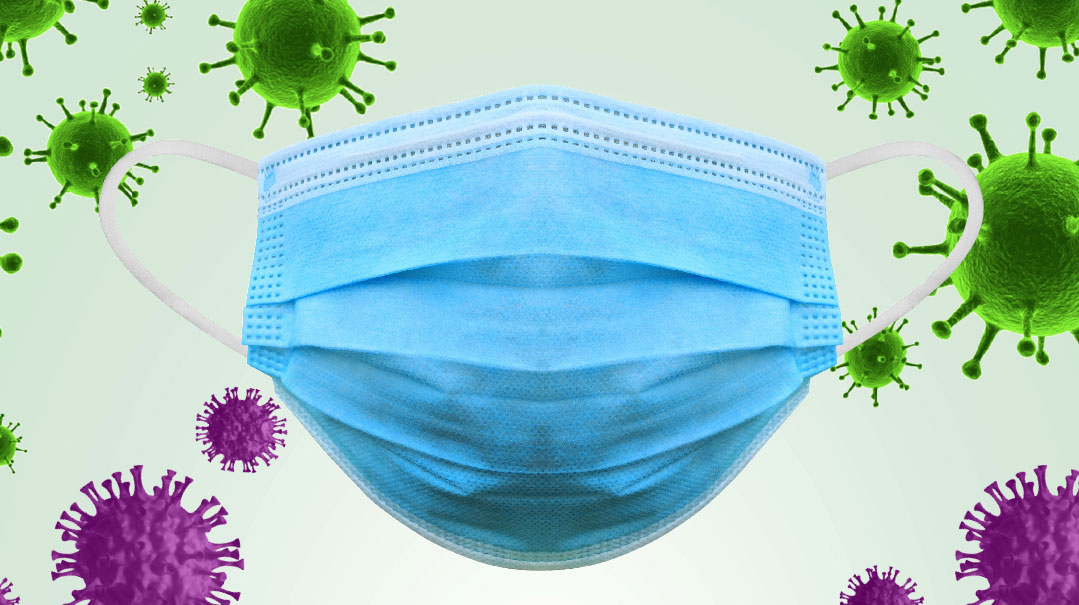Masks Unmasked
| June 10, 2020It seems like face masks will be here to stay for a while. Let’s take a deeper look at masks

Imagine that this past Rosh Hashanah, someone would have told you that in just a few months, everyone will be walking around wearing a mask. Everywhere — for davening, for grocery shopping, for going to the doctor’s office. What would you have said? I don’t know about you, but I think I would have been shocked, surprised, and skeptical.
Well, as crazy as it might have sounded just six months ago, that is now the reality in many parts of the world. People are walking around wearing a whole variety of masks! Baruch Hashem, we’ve seen a vast improvement in the situation, but it seems like face masks will be here to stay for a while. Let’s take a deeper look at masks.
Why is it important to wear a mask?
According to many experts, wearing a mask is an important tool that we can use to slow the spread of COVID-19, the new virus that has turned our world over. Many kinds of masks actually protect other people more than they protect the wearer. That’s important, because for many people (especially children and young, healthy adults), the virus does not cause serious illness. In fact, kids can have Covid-19 and may not feel sick at all! In the meantime, though, every time they sneeze or cough or even talk, they can spread the virus to people who are at risk of getting really sick, like elderly people, or people who have chronic (ongoing) health issues.
Other, more specialized kinds of masks do offer the wearer varying degrees of protection from the virus. These kinds of masks are important to health-care workers who are taking care of sick people, like doctors and nurses, and possibly for people who are considered high risk (your parents can ask your doctor’s advice if they feel that you, or someone else, might be in that category).
Different Kinds of Masks
There are three main types of masks you’ll see around you. There are cloth masks, which are reusable and can be washed (and are often the most comfortable kind to wear). There are surgical masks, which are also called medical masks. Those masks mostly help prevent the person from spreading their own germs. There are also respirator masks, which protect the wearer himself from small particles and droplets that may be around him. Here are the differences between them.
Cloth Masks
- Simple.
- Inexpensive.
- Can be homemade.
- Can be washed in the washing machine.
- Reusable.
- Can be personalized (you can find cloth masks with pictures and designs, or even have your own photos printed on them!)
- Blocks droplets of saliva (that are naturally expelled as people speak, cough, or sneeze) from spreading, thus offering more protection to everyone around them.
- When other kinds of masks are in short supply, having the general public use cloth masks can protect a dwindling supply of other kinds of masks for health-care workers.
Surgical Masks
- Disposable.
- Generally easy to find .
- Made with three layers, which offers the wearer some protection from contact with droplets of saliva (that are naturally expelled as people speak, cough, or sneeze) that may contain the virus
- Blocks droplets of saliva (that are naturally expelled as people speak, cough, or sneeze) from spreading, thus offering more protection to everyone around them.
Respirator Masks
- Most common kind used is called N95, which is designed to filter at least 95% of small, airborne particles, including viruses.
- Filters the air you breathe and offers a good degree of protection (though still not 100%)
- Close facial fit.
- Generally not suitable for children and people beards, who cannot ascertain a proper seal, and is also not suitable for people who have conditions that may make breathing difficult for them.
- Generally not recommended for the general public; health-care providers are trained to ascertain proper seal and fit, and do not reuse masks.
- Some N95 masks come with valves. That makes the mask easier to breathe through, but is strongly discouraged, because completely unfiltered air is released when the wearer exhales. That means that this kind of mask makes people around the wearer even more vulnerable than simpler kinds of masks.
- Recommended mask for health-care workers, like doctors and nurses.
Wacky Masks
Some people can get pretty creative, even when the subject is face masks to protect them from a foreign virus. Take a look at some of the crazy masks that have been spotted around the world!
Hear from Prestige America and Cambridge Masks Co.
Prestige America is another one of the top respirator-mask manufacturers in the world. Due to the tremendous increase in demand, Mike Bowen, the vice president of the company, told Mishpacha Jr. that they are receiving thousands of emails and that they’re simply unable to add any new distributors until after the pandemic.
Cambridge Mask Co. is a leading British mask producer, shipping masks all over the world. Along with all other mask producers, they too reported a tremendous increase in demand and completely sold out their entire stock in January and February, the early months of the pandemic. They told Mishpacha Jr. that they are working hard to meet the demand of preorders and have expanded their team to ensure that as many people as possible have the protection they need at this time.
Wishing all of our readers healthy and safe mask wearing!
-3M is one of the world’s largest manufacturers of surgical masks, face shields, and N95s. They expect to be making 50 million N95 masks monthly by June 2020; and plan to produce 2 billion N95s globally within a year.
-One of the new Chinese mask factories was created in just 11 days (founder: Guan Xunze).
-Experts agree that masks do not replace the need for social distancing, as they are far from foolproof. Keeping a distance from others and washing hands well with soap remain critical!
-A face shield is not a substitute for a mask.
(Originally featured in Mishpacha Jr., Issue 814)
Oops! We could not locate your form.






